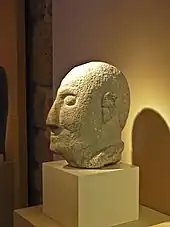Gallaeci
See also: gallaeci
English
Alternative forms
Derived terms
Latin


Head of a Gallaecian, wearing a torc and helmet

They lived in fortified towns and hill-forts
Alternative forms
Etymology
From the endonym of a local Celtic tribe (compare Ancient Greek Καλλαϊκοί (Kallaïkoí)). Either from Proto-Celtic *kallī (“wood”) or from a descendant of Proto-Indo-European *kl̥H-ní-s (“hill”), from Proto-Indo-European *kelH- + a relational suffix *-aecus, of Lusitanian or Hispano-Celtic origin.[1] Compare also Gallus, Gallia, and Portus Cale, whence Portugal. See also Gael, Galway.
Pronunciation
- (Classical) IPA(key): /ɡalˈlae̯.kiː/, [ɡälˈlʲäe̯kiː]
- (Ecclesiastical) IPA(key): /ɡalˈle.t͡ʃi/, [ɡälˈlɛːt͡ʃi]
Proper noun
Gallaecī m pl (genitive Gallaecōrum); second declension
- A Celtic people of Hispania Tarraconensis, who dwelt in the northwestern part of the Iberian peninsula
Declension
Second-declension noun, plural only.
| Case | Plural |
|---|---|
| Nominative | Gallaecī |
| Genitive | Gallaecōrum |
| Dative | Gallaecīs |
| Accusative | Gallaecōs |
| Ablative | Gallaecīs |
| Vocative | Gallaecī |
References
- Gallaeci in Gaffiot, Félix (1934) Dictionnaire illustré latin-français, Hachette
- Moralejo, Juan J. (2008). Callaica nomina: estudios de onomástica gallega. A Coruña: Fundación Pedro Barrié de la Maza, pages 113–148. →ISBN.
This article is issued from Wiktionary. The text is licensed under Creative Commons - Attribution - Sharealike. Additional terms may apply for the media files.